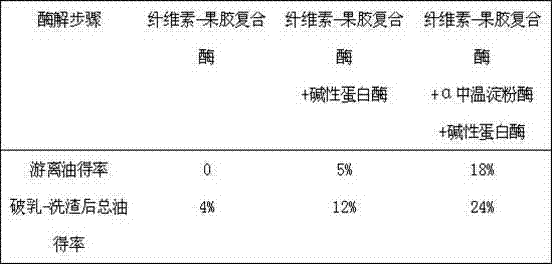Method for extracting oil from peony seeds or peony seed dregs
A peony seed meal and peony seed technology, which is applied in the production of edible oil/fat, fat oil/fat, and fat production, can solve the problems of high energy consumption, high cost, and solvent residue, and achieve low energy consumption and low equipment requirements , No solvent residue effect
- Summary
- Abstract
- Description
- Claims
- Application Information
AI Technical Summary
Problems solved by technology
Method used
Image
Examples
Embodiment 1
[0025] Crush the raw materials and pass through a 40-mesh sieve. Take 50g of seed powder, add 250ml of water, and mix to form a slurry for later use. Use 1mol / L hydrochloric acid to adjust the pH of the slurry to 4.5, add 15mL of cellulose-pectin complex enzyme (Danish Novozymes complex cellulase Celluclast 1.5L: polygalacturonase (pectinase) Pectinex Ultra SP-L Mixed at 2:1, enzyme activity 1.2*10 5 U / g), stirring and extracting at 50°C for 2 hours to obtain enzymolysis solution A, adjust the pH of enzymolysis solution A to 7 with 1mol / L sodium hydroxide, add 6mL α-medium temperature amylase (Danish Novozymes medium temperature amylase BAN 480, enzyme Live 4*10 4 U / g), stirring and extracting at 70°C for 0.5h to obtain enzymolysis solution B, adjust the pH of enzymolysis solution B to 8.5 with 1mol / L sodium hydroxide, add 1g alkaline protease (Novozyme Alcalase 2.4L, enzyme Live 2.5*10 5 U / g), stirring and extracting at 60°C for 2 hours to obtain the final enzymolysis s...
Embodiment 2
[0034] Crush the raw materials and pass through a 40-mesh sieve. Take 1000g of seed powder, add 4L of water, and mix to form a slurry for later use. Use 1mol / L hydrochloric acid to adjust the pH of the slurry to 4.5, add 30g of cellulose-pectin complex enzyme (commercially available domestic cellulase: pectinase in 1:1, enzyme activity 5*10 4 U / g), stirring and extracting at 50°C for 2.5h to obtain enzymolysis solution A, adjust the pH of enzymolysis solution A to 7 with 1mol / L sodium hydroxide, add 20g α-medium temperature amylase (commercially available domestic α-medium temperature amylase, enzyme Live 1*10 4 U / g), stirring and extracting at 70°C for 1 hour to obtain enzymolysis solution B, adjust the pH of enzymolysis solution B to 8.5 with 1mol / L sodium hydroxide, add 50g alkaline protease (commercially available domestic alkaline protease, enzyme activity 1 *10 5 U / g), stirring and extracting at 60°C for 2 hours to obtain the final enzymolysis solution. Centrifuge ...
Embodiment 3
[0039] Crush the raw materials and pass through a 40-mesh sieve. Take 500g of seed powder, add 2.5L of water, and mix to form a slurry for later use. Use 1mol / L hydrochloric acid to adjust the pH of the slurry to 4.5, add 45g of cellulose-pectin compound enzyme (commercially available domestic cellulase: pectinase is compounded at 1:1, and the enzyme activity is 2*10 4 U / g), stirring and extracting at 50°C for 2.5 hours to obtain enzymolysis solution A, adjust the pH of enzymolysis solution A to 7 with 1mol / L sodium hydroxide, add 8g of α-medium-temperature amylase (commercially available domestic α-medium-temperature amylase, enzyme Live 1*10 4 U / g), stirring and extracting at 70°C for 1 hour to obtain enzymolysis solution B, adjust the pH of enzymolysis solution B to 8.5 with 1mol / L sodium hydroxide, add 35g alkaline protease (commercially available domestic alkaline protease, enzyme activity 5 *10 4 U / g), stirring and extracting at 60°C for 2 hours to obtain the final ...
PUM
 Login to View More
Login to View More Abstract
Description
Claims
Application Information
 Login to View More
Login to View More - R&D
- Intellectual Property
- Life Sciences
- Materials
- Tech Scout
- Unparalleled Data Quality
- Higher Quality Content
- 60% Fewer Hallucinations
Browse by: Latest US Patents, China's latest patents, Technical Efficacy Thesaurus, Application Domain, Technology Topic, Popular Technical Reports.
© 2025 PatSnap. All rights reserved.Legal|Privacy policy|Modern Slavery Act Transparency Statement|Sitemap|About US| Contact US: help@patsnap.com

